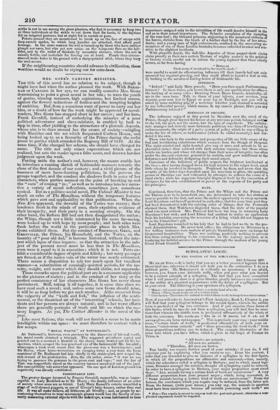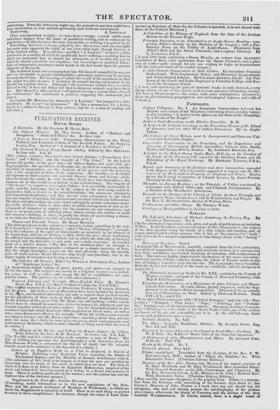SCHOLASTIC LOGIC.
TO THE EDITOR OF THE SPECTATOR.
24th February 1839.
MI: DE AR SPEC.—It is lucky that you arc a better practical logician than a theoretical one, otherwise I should not hold you in the estimation I do as a political guide. Mr. BosaN4 c c.r is evidently an ignoramus. 1 am afraid, however, you forgot your Aristotle sadly, when you gave what you fancied to he a correct example of a syllogism. The fact that you have committed what I will presently show is a gross blunder, greatly increases my conviction of the utility of a practical acquaintance with the forms of a syllogism. But to your error. The following is your specimen of a syllogism.
" carnivorous animals have a certain kind of teeth.
" Minor—These fossil teeth are of a certain kind.
" Conclusion—Therefore the animal to which those teeth belonged was carnivorous."
Now, if your will refer to ARISTOTLE'S First Analytics, Book I., Chapter 5, you will find that your syllogism belongs to tine second figure, wherein the middle term is predicated of tlui two extremes. And it' you examine those forms of this figure, which he says du not form a syllogism, you will find that he men- tions that wherein the middle term is predicated. affirmatively of the whole of both the extremes. His words are " Eziv do 7.'2 II wanerh rot, N x'ees 'roe Kmnrre;i7mi, sure gyra, er uxAo^/ig pos." This is precisely your case : your middle term, " certain kinds of teeth," is predicated affirmatively of both your ex tremes, "carnivorous animals" and " those possessing the fossil teeth :" from these propositions nothing can be deduced. The example illustrative of the error into which you have fallout, which is given in the Logic of PHILIP du Trieu, is
" All brutes arc animals ; "All men are animals ; "Therefore, All men arc brutes.
You hardly can require further proof of your mistake : if you do, I will convince you by explaining what you meant to say. From the context, I infer that you intended to give an instance of a syllogism in the first figure, in which all the propositions are affirmative and universal,—that, namely, which the schoolnten called a syllogism in Barbara ; mint to which malty logi- cians, Holmes amongst the number, thought all syllogizing could be reduced. In order to have a syllogism in Barbara, your major proposition must stand thus : "ALL animals having a certain kind of teeth are carnivorous." A very different proposition from your present major ; which, being converted, is, " SOME auimals having a certain kind of teeth are carnivorous." former, the conclusion which you require may he deduced, from the latter not.ntohte. From the former, (with your minor,) you may say, the animals in question ,must have been carnivorous, because all twimals possessing such teeth* are * Noe—The cupola is meant to express both the past and present, otherwise a 0014- ',Heated expression would he required,
carnivorous. From the latter you might say, the animals in question might have been carnivorous, as some animals possessing such teeth are carnivorous. Yours truly, A LOGICL1N.
[Our correspondent is right : we were loose—wrong : a result which must sometimes happen from the haste of periodical writing, and an endeavour to popularize,—in this instance the more censurable, as nothing was gained by it.
omething., however, is always gained by five discussion ; and our oversight has made more apparent the truth of our view—that logic, though limited, is
of the highest utility. It would have qualified "A Logician" to detect a fidse conclusion in a matter of which he practically knew nothing,--enabling him to direct an anatomist how to amend his statement, or, if needful, the way in
which he should extend hi, investigation : but knowledge—a practical know- 'Mae of comparative anatomy—roust decide in the last resort upon the generic dmmeter of the teeth.
The technical terms our correspondent has felt himself compelled to use, are not very fluvourable topopular intelligibility ; and many readers may be at a loss to comprehend him. meaning. or rather the result of his argument, is, that our major was fuse because it included all animals having carnivorous teeth, bat did not exclude others. Although " all carnivorous animals have a certain
kital of teeth," it does not follow but that herbivorous animals may bare them too. But when it is affirmed that "ut/ animals having a certain kind of teeth are carnivorous," the conclusion is positive, supposing the anatomical pet correct.
As regards Mr. Bosa i-vr, however, " A Logician" has jumped to it false conclusion. Ile is not " an ignoramus." He has a monomania for a bobby, and he lies ridden it through a large octavo; but he is a mean of reading and reflection.]



























 Previous page
Previous page